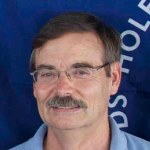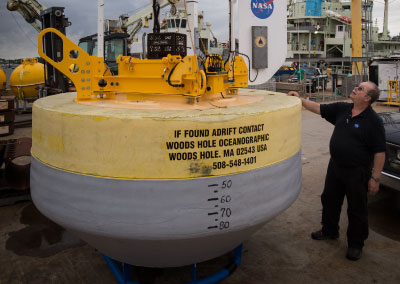Science Webinars: Seeking Salt
Everyone knows that the ocean is salty, but did you know that salt is essential to the recipe for our entire climate and
life on Earth?
Hear from three prominent scientists from the SPURS (Salinity Processes in the Upper Ocean Regional Study) research effort as they share their newest findings and contribute to the core understanding of ocean processes. This three-part series explores ways in which SPURS scientists are seeking to better understand ocean salinity - which affects everything from the water cycle to climate change.

Dr. Eric Lindstrom is a Program Scientist in the Science Mission Directorate at NASA Headquarters in Washington D.C. He has degrees in Earth and Planetary Sciences from Massachusetts Institute of Technology (1977) and Physical Oceanography from the University of Washington (1983). His scientific interests include circulation of the ocean and air-sea exchange processes. Read more about Eric here.

Salinity's Connection to Climate Change and an Accelerated Water Cycle
Presented by Dr. Raymond Schmitt – March 5, 2013
The saltiness of the ocean is controlled by the water cycle. And the temperature and salinity of ocean water together control ocean density - the crucial driver of ocean circulation. Dr. Schmitt explains how ocean circulation works and its profound impacts on the climate.
SPURS Chief Scientist Dr. Raymond Schmitt is a Senior Scientist at Woods Hole Oceanographic Institution. Dr. Schmitt earned his Ph.D. in physical oceanography from the University of Rhode Island and his B.S. in physics from Carnegie Mellon University. His research interests include oceanic mixing processes such as "salt fingers" and the oceanic freshwater cycle. He has been a J.S. Guggenheim fellow and is a Fellow of the American Geophysical Union. Read more about Ray here.
 The interdisciplinary SPURS cruise involved the coordination of an armada of technology - from in-water instruments to shipboard measurements to satellites in orbit around Earth. Dr. Bingham shows us the results of the team's research, including real data collected during the cruise.
The interdisciplinary SPURS cruise involved the coordination of an armada of technology - from in-water instruments to shipboard measurements to satellites in orbit around Earth. Dr. Bingham shows us the results of the team's research, including real data collected during the cruise.
Dr. Fred Bingham is a Professor in the Department of Physics and Physical Oceanography at the University of North Carolina at Wilmington. His research interests include global distributions of sea surface salinity and large scale regional physical oceanography - the Kuroshio, the western North and Equatorial Pacific, and Onslow Bay, North Carolina.
Hear from three prominent scientists from the SPURS (Salinity Processes in the Upper Ocean Regional Study) research effort as they share their newest findings and contribute to the core understanding of ocean processes. This three-part series explores ways in which SPURS scientists are seeking to better understand ocean salinity - which affects everything from the water cycle to climate change.
Seeking Salt: Measuring a Key Ingredient of Climate

From Sailing Ships to Satellites: Studying Salinity Through A Sensor Web
Presented by Dr. Eric Lindstrom – February 26, 2013
What is a sensor web, and how does it help SPURS? Dr. Lindstrom takes us on a trip through salinity research, revealing how ocean exploration has evolved over time and what we're using now to investigate what's happening in the unique "ocean desert" of the North Atlantic.
Presented by Dr. Eric Lindstrom – February 26, 2013
Dr. Eric Lindstrom is a Program Scientist in the Science Mission Directorate at NASA Headquarters in Washington D.C. He has degrees in Earth and Planetary Sciences from Massachusetts Institute of Technology (1977) and Physical Oceanography from the University of Washington (1983). His scientific interests include circulation of the ocean and air-sea exchange processes. Read more about Eric here.

Salinity's Connection to Climate Change and an Accelerated Water Cycle
Presented by Dr. Raymond Schmitt – March 5, 2013
SPURS Chief Scientist Dr. Raymond Schmitt is a Senior Scientist at Woods Hole Oceanographic Institution. Dr. Schmitt earned his Ph.D. in physical oceanography from the University of Rhode Island and his B.S. in physics from Carnegie Mellon University. His research interests include oceanic mixing processes such as "salt fingers" and the oceanic freshwater cycle. He has been a J.S. Guggenheim fellow and is a Fellow of the American Geophysical Union. Read more about Ray here.

Dr. Fred Bingham is a Professor in the Department of Physics and Physical Oceanography at the University of North Carolina at Wilmington. His research interests include global distributions of sea surface salinity and large scale regional physical oceanography - the Kuroshio, the western North and Equatorial Pacific, and Onslow Bay, North Carolina.

